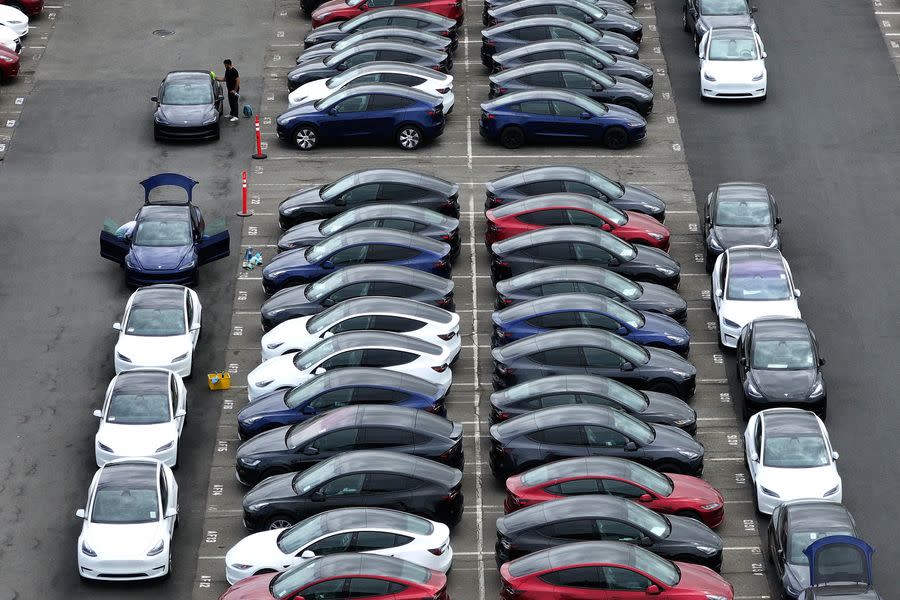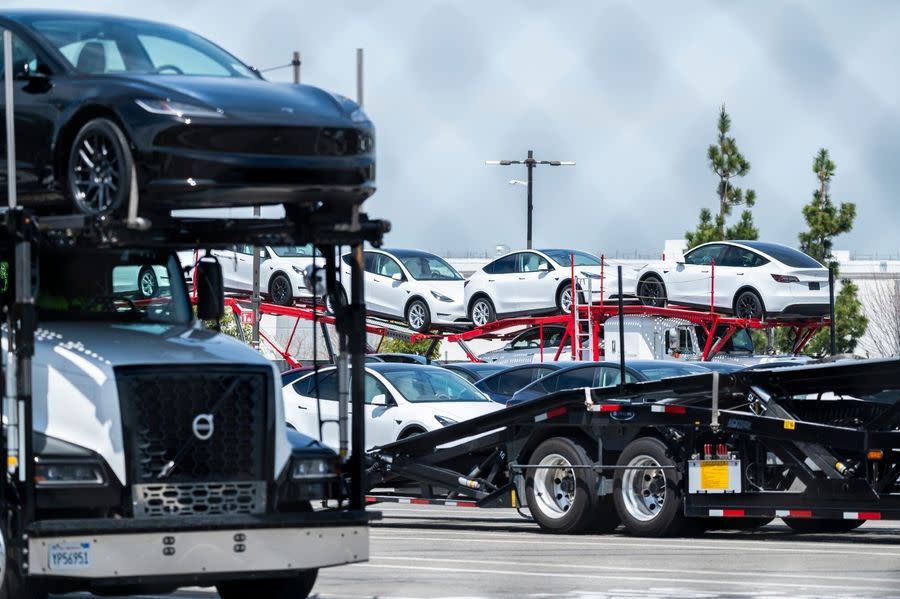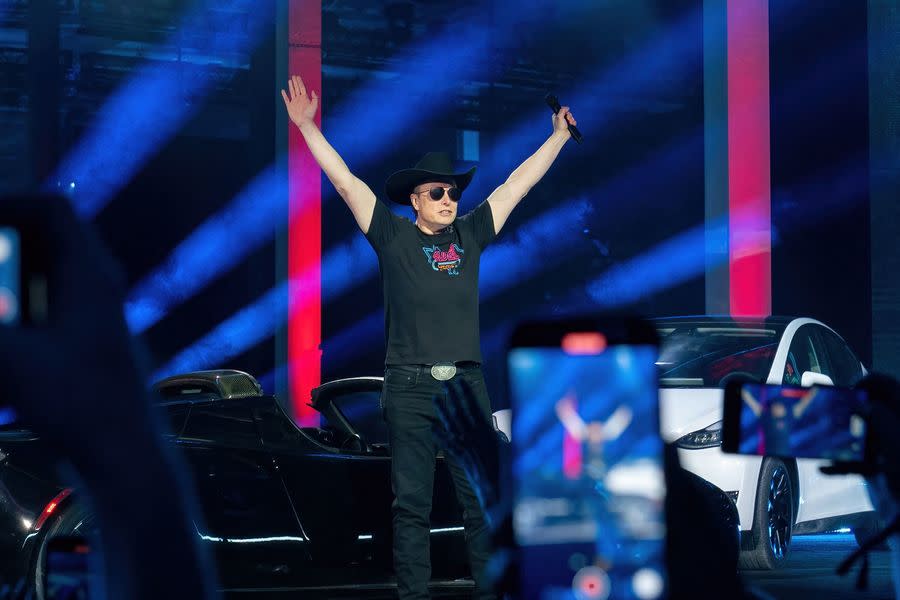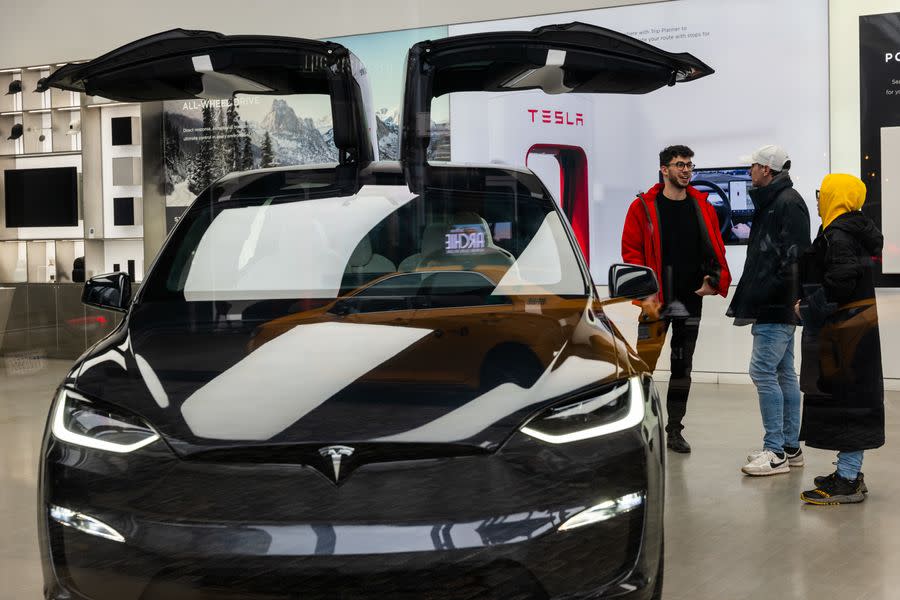How government programs help fuel Tesla profit
Things could have been so much worse for Tesla (TSLA) this past quarter.
In a period when profit fell 45%, the electric carmaker benefited from a potent weapon for improving its income statement: regulatory credits.
A record amount, equal to more than half of Tesla’s second-quarter profit, was attributed Tuesday to the sale of these credits to rival automakers that use them to meet emission rules.

Most Read from The Wall Street Journal
The money, essentially pure profit, isn’t technically a subsidy. Tesla rather benefits from government programs—such as in California—that are aimed at pushing the development of electric and other green vehicles.
The latest payday arrived as Musk reiterates that he is in favor of eliminating government subsidies to encourage the development of electric vehicles and pushes for the return to the White House of Donald Trump, who has pledged to reverse EV policies intended to nurture the industry in the US.
Tesla’s ability to make popular EVs—so many that it earns regulatory credits to sell to rivals around the world—also comes as Musk is talking about how he views his company not as a simple automaker, but as an artificial-intelligence company developing autonomous, or driverless, cars and humanoid robots.

Trump’s presidential campaign has made attacking the Biden administration’s efforts to bolster EVs a key part of Trump’s message. The Democrat’s administration championed a 2022 law that tied consumer tax credits for buying EVs to industry efforts to bolster the US supply chain for them.
The intent of the effort is to make the nation less dependent on China for supplies. President Biden also raised tariffs on Chinese electric cars to 100% while Trump has also suggested jacking up tariffs.
When asked directly if the elimination of the federal EV subsidies might hurt Tesla profitability in the near term, Musk on Tuesday said that would be the case.
“I guess that there would be, like, some impact, but I think it would be devastating for our competitors and it would hurt Tesla slightly,” Musk said. “But long term, probably actually helps Tesla, that would be my guess.”
Then to hit on a point he has been making in recent months about how he sees Tesla’s future: “The value of Tesla overwhelmingly is autonomy. These other things are in the noise relative to autonomy.”

Still, government help doesn’t hurt. In fact, it helped a lot.
Regulatory credits reported Tuesday for the period that ended in June totaled just shy of $1 billion, compared with $282 million in the same quarter a year ago and $1.79 billion for all of 2023.
Even for a revenue source that has a history of coming in lumpy from quarter to quarter, the recent three-month stretch was unusually large. Throughout Tesla’s history, the company has benefited from good timing on those sales, helping make a bad quarter look better or allowing Tesla to claim victory as a profitable outlet.
The company has previously said it is hard to forecast these sales, and Musk has described them as a “small part of the equation for Tesla.”
“Some of what’s happening here is the other manufacturers are kind of like waiting to see how their EV sales do before buying any credits from Tesla,” Musk said in 2019. “And so it kind of depends on how that goes. If they sell more EVs, then there’s not really a need to do a deal with Tesla.”
In California alone, where the idea of regulatory credits really took root before being copied around the world, Tesla as an EV seller has received an estimated value of credits worth more than $2.48 billion as of early last year, according to Gov. Gavin Newsom’s office.

The governor has said the credits have been crucial to Tesla’s success. He was quoted by the San Francisco Chronicle in 2022 talking at a conference about the state’s efforts to encourage green vehicles. “There was no Tesla without California’s regulatory bodies, and regulation,” he said at the time.
Ultimately, California wants to ban the sale of gas-powered vehicles by 2035. Several other states have copied its regulations—setting up a likely fight if there is another Trump administration.
Trump’s term in the White House saw a lengthy legal battle between his administration and California over fuel-economy requirements, creating uncertain terrain for automakers making product plans years in advance.
In 2019, the Trump administration eliminated California’s special ability to set more stringent vehicle-emission standards than federal rules called for, arguing at the time that the move would give consumers access to cheaper and safer cars.
That was followed by the Biden administration reversing course after it took over and a US Court of Appeals denying a Republican-led effort to overturn California’s authority to establish its own car-pollution rules.
Meanwhile, Republicans in Congress have also had their sights on disrupting California’s plans.
In a possible new Trump administration, amid these conflicting requirements, some automakers that earn their profits from SUVs and trucks may have a lot less incentive to make EVs in the US, where they have been struggling to reduce costs to compete with Tesla. For certain automakers, some on Wall Street wonder, might it simply be cheaper to pay for regulatory credits than to sell EVs at huge losses.
And as US rivals struggle to lower their EV costs to match Tesla, Chinese competitors that have been successful in cracking such barriers now face dramatic tariffs. The combined effect for Tesla in a Trump administration are policies that might deter US rivals from catching up while keeping savvy overseas rivals out.
Write to Tim Higgins at tim.higgins@wsj.com
